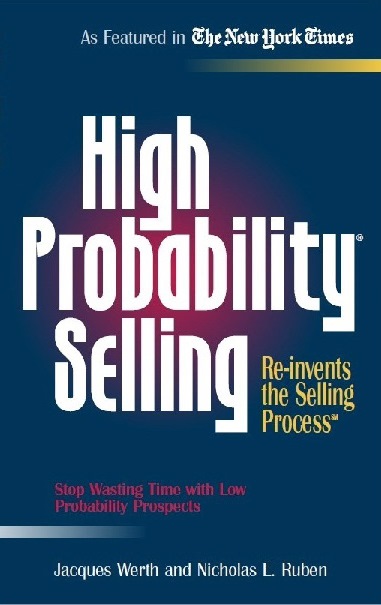
So You’ve Read the Book – Now What?
If you have any questions about High Probability Selling, we are having a live and interactive video meeting on Zoom
by Jacques Werth
I’m fascinated by the quick learning abilities of my children when they play video games. Most recently my children received a Wii game unit for Christmas. Before the day had expired Samuel, my 8-year-old son challenged me to a boxing match.
Finally, I thought, something electronic where I can whup on my kids. I’ve got formal training in the martial arts and can move my hands quicker than any 8-year-old boy on the planet. The results? I didn’t make it past round 1. Sam KO’d me.
How on earth do children learn electronic games so quickly? Why can’t they learn their school lessons or how to clean their rooms as quickly? The answer? Feedback. The feedback on a video game is neutral, no emotion and it’s immediate. ‘You missed.’ ‘Hit!’ ‘Better luck next time.’
The young skulls full of mush assimilate the information and they immediately try again. How does it work in life or in the business climate? (Sales and business are viewed the same because someone is selling something even when the boss delegates you a task. He just sold you on doing his job.)
A major stumbling block in our business environment is that we rarely deliver direct or neutral feedback. For example, yesterday an office supply salesperson solicited my office. Charles and I were in a meeting when she walked in unannounced with her sales pitch.
She started out by building rapport. “How you doing,” she said as she walked over to my desk and shook my hand. “What is your name,” she asked? She repeated this with Charles. She small-talked a little about our office and then explained that she handles the Chiropractor’s office supplies on the third floor directly above us in the building.
If I were a video game she would hear with my neutral computer voice: “not important, try again.” Or “prospect doesn’t care about the Chiropractor, get to the point.”
For over 80 years sales trainers have taught their students to build rapport. It doesn’t work, it’s manipulative and everybody knows what you’re doing. So why do we continue to build rapport? Why can’t we learn from our children? ‘You missed!’ ‘Try something else.’
The top 1 percent of all salespeople across 23 industries never use rapport building as their modus operandi. After we informed our office-supply lady that we had no needs or wants, she explained how she was the Area Sales Manager and that she also handles another prominent tenant’s account, followed up with her well-trained question (that she asked five times during the visit) “What one product is the most difficult for you to find?”
What I said and what I thought were not identical. What I thought was: “A high quality sales person properly trained.” What I said was: “we are a small office and can find everything we need at Office Depot.”
What I should have said is: “I don’t do business with people who sell the way you do.”
In business and sales we have been trained to ignore the obvious feedback by prospects. When the prospect says “no” or “I’m not interested“, it’s the equivalent of the computer saying, “missed.” When you persist and persuade and manipulate, you antagonize and push away the prospect.
Kids are successful at computer games because they don’t ignore the feedback. They don’t negotiate with “missed.” They adjust and move on.
Note: Richard Himmer is a contributing author to the High Probability Selling blog. This article appeared previously on his own blog, at www.pyrblu.com/blog/2010/03/what-if-selling-was-more-like-a-video-game/

If you have any questions about High Probability Selling, we are having a live and interactive video meeting on Zoom
Ultimately, staying in the game is the deepest Why behind our decisions. When examining how we make our decisions, we
Take the first step toward mastering a proven sales system that works. Whether you’re just starting with the High Probability Selling book or looking for advanced training and coaching, we have the tools to help you succeed. Explore our resources and begin transforming the way you sell—consistently and confidently.